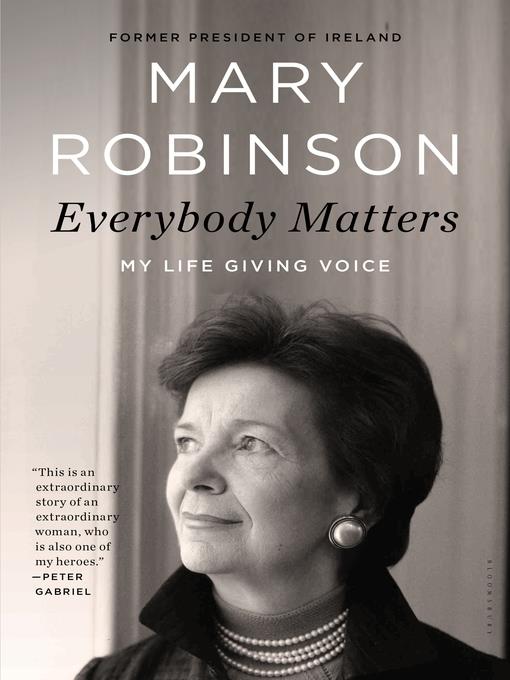
Everybody Matters
My Life Giving Voice
- اطلاعات
- نقد و بررسی
- دیدگاه کاربران
نقد و بررسی

November 26, 2012
The first woman president of Ireland and a lifelong activist in human rights, Robinson fashions a stately, forthright autobiography with an emphasis on her constitutional law work and teaching. Born in 1944 to two doctors with a thriving practice in Ballina, in north County Mayo, Ireland, the only daughter in a lineup of five children, Robinson nee Mary Bourke was inculcated early on by her deeply Catholic mother with the notion that the Bourkes had aristocratic roots and were somehow more "special" than the humbler families in town, an assumption of status the author deeply rejected. Brainy, athletic, determined to do something worthwhile with her life, Robinson excelled at school, ending up studying law at Trinity College, Dublin, then at Harvard, a rare woman in her classes and determined to use the law for social change in what she saw as an unenlightened Ireland. From barrister to professor to senator (winning her first seat at age 25) she championed issues for women and families such as contraceptive use and divorce, and pushed for Ireland's inclusion into the European Union. Married to the political cartoonist (and Protestant) Nick Robinson and tapped for the presidency in 1990, Robinson changed the role of president from figurehead to booster and activist who traveled widely over her seven-year term; subsequently she served as U.N. High Commissioner for Human Rights and as one of Nelson Mandela's Elders. She details her work at hot spots across the globe, and writes engagingly and warmly of her current foundation addressing issues of climate change and world poverty.

December 15, 2012
An autobiography from one of the world's leading political figures provides a special insight into ongoing civil and human rights questions. Oxfam International honorary president Robinson explores the events that shaped her qualifications for the role she played on the global stage. An early advocate of church/state separation and a career of legal advocacy led her first to the Irish Senate, then to the country's presidency, then to a position as the U.N.'s high commissioner for human rights. Educated in Paris during the Algerian War, Robinson writes about how her views of human rights were shaped philosophically and legally: "I went back to reading about Gandhi...I read more of Martin Luther King." This foundation stayed with her as she qualified for law degrees on both sides of the Atlantic and began to work in areas where conflict between personal morality and criminal codes became a source of unjust individual suffering. Ireland's European treaty commitments on human rights provided a lever to secure advances within her own country, which both benefited the cause of individual Irish men and women as well as people throughout Europe. Robinson describes winning Josie Airey the right to separate from an abusive husband "as the type of case [she] loved." Successful political advocacy helped her become Ireland's first female president, and Robinson recounts how she transformed the office. Later controversies arising during the Iraq War have not undermined her international stature. She bases her view of human rights on FDR's "Four Freedoms, and she emphasizes the importance of the universal right to "decent work." A worthy addition to the growing list of memoirs from world-class servants of the public.
COPYRIGHT(2012) Kirkus Reviews, ALL RIGHTS RESERVED.




دیدگاه کاربران